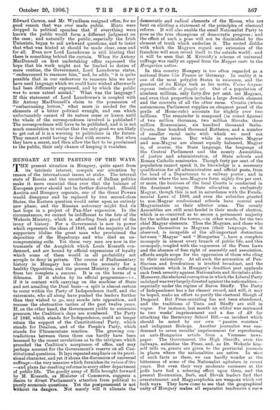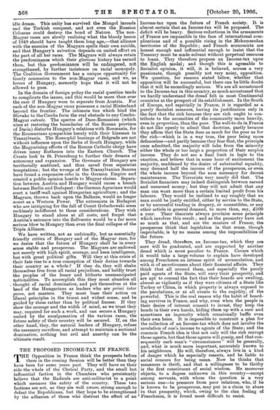HUNGARY AT THE PARTING OF THE WAYS. T HE present situation
in Hungary, quite apart from its intrinsic interest, compels our attention by reason of the international issues at stake. The internal state of Russia and the uncertainties of Balkan politics make it more essential than ever that the balance of European power should not be further disturbed. Should Austria and Hungary separate, one of the Great Powers would disappear and be replaced by two second-class States, the Eastern question would enter upon an entirely new phase, and the Russian autocracy might find its last hope in a project of Pan-Slav expansion. In the circumstances, we cannot be indifferent to the fate of the Wekerle Ministry, which is affording fresh proof of the irony of history. For a Government is now in power which represents the ideas of 1848, and the majority of its supporters idolise the great man who proclaimed the deposition of the Hapsburgs and who died an un- Compromising exile. Yet these very men are now in the trammels of the Ausgleich which Louis Kossuth con- demned, and are bound by official expressions of loyalty which some of them would in all probability not scruple to deny in private. The course of Parliamentary history in Hungary has shown the necessity for a healthy Opposition, and the present Ministry is suffering from too complete a success. It is on the horns of a dilemma. If it abides by its official programme—i.e., if it is content with carrying on the machine of State and not assailing the Dual basis—a split is almost certain to occur within the Party of Independence itself, and the extremists, who all along have pushed the leaders further than they wished to go, may secede into opposition, and resume the obstructive tactics of the past twelve years. If, on the other hand, the Government yields to extremist pressure, the Coalition's days are numbered. The Party of 1848, which stands for Independence, could no longer retain the support of the Constitutional Party, which stands for Dualism, and of the People's Party, which Stands for Fltramontane reaction. The growing con- tradictions between these three can hardly have been lessened by the recent revelations as to the intrigues which preceded the Coalition's acceptance of office, and may perhaps account for the Government's reserve on all Con- stitutional questions. It lays repeated emphasis on its provi- Sional character, and yet it shuns the discussion of universal suffrage—the very measure which furnishes its raison d'être —and plans far-reaching reforms in every other department of public life. The goodly array of Bills brought forward by M. Kossuth, as Minister of Commerce, suggests a desire to divert Parliament's attention from political to purely economic questions. Yet the postponement is not *About its dangers. Not merely will it alienate the democratic and radical elements of the House, who are bent on eliciting a statement of the principles of electoral reform. It will also enable the small Nationalist Party to pose as the true champions of democratic progress ; and the effect of such a pose will not be diminished by the element of truth which underlies it. The rooted dislike with which the Magyars regard any extension of the franchise will soon reveal itself to the outside world ; and it will be seen that M. Krist6ffy's scheme of universal suffrage was really an appeal from the Magyar caste to the Hungarian nation.
In this country Hungary is too often regarded as a national State like France or Germany. In reality it is one of the most polyglot States in existence, and the greatest of its Kings took as his motto, Units linguae regnum imbecilic et fragile est. Out of a population of nineteen millions, only forty-five per cent. are Magyars, and even that proportion includes a large Jewish element and the converts of all the other races. Croatia (whose autonomous Parliament supplies an eloquent proof of the perils of Home-rule) accounts for slightly over two millions. The remainder is composed (in round figures) of two million Germans, two million Slovaks, three million Roumanians, six hundred thousand Serbo- Croats, four hundred thousand Ruthenes, and a number of smaller racial units with which we need not confuse the issue. But while in numbers Magyar and non-Magyar are almost equally balanced, Magyar is, of course, the State language, the language of the Central Parliament and the county Assemblies, of justice and administration, of State schools and Roman Catholic seminaries. Though forty per cent. of the population cannot speak it, its knowledge is a necessary qualification for all administrative and official posts, from the head of a Department to a railway porter ; and in districts where the non-Magyars form eighty-five per cent. or more, the business of the local Courts is conducted in the dominant tongue. State education is exclusively Magyar, though this is not in accordance with the Funda- mental Laws of 1868, and even the subsidies granted to non-Magyar confessional schools have control and Magyarisation as their ulterior aims. The county Assemblies are still semi-feudal in their mode of election, which is so contrived. as to secure a permanent majority for the nobles and the towns,—in other words, for the two chief Magyar elements. Thus the Magyars, and those who profess themselves as Magyars (their language, be it observed, is incapable of the all-important distinction between " Magyar " and " Hungarian "), have a complete monopoly in almost every branch of public life, and this monopoly, coupled with the vagueness of the Press Laws and the absence of free right of assembly and. association, affords ample scope for the oppression of those who cling to their nationality. At all such the accusation of Pan- Slavism and Irredentism is levelled broadcast, and the Chauvinism which is Hungary's deadliest pest applauds each fresh severity against Nationalists and SoCialists alike. Moreover, the electoral corruption in which the Liberal Party indulged was very largely directed against the nationalities,— especially under the regime of Baron Biinffy. The Party of Independence has a far cleaner record, and will, it may be hoped, make an effort to purify the electoral Slough of Despond. But Press-muzzling has not been abandoned, and the traditions of Tisza and Blinffy are still in vogue. For instance, last month an editor was sentenced to two weeks' imprisonment and a fine of ..t8 fpr attacking the Berzeviczy School Bill,—an incident which should be noted by our own "passive resisters" and indignant Bishops. Another journalist was con- demned to seven months' imprisonment for reproducing an anti-Hungarian article from a Viennese- news- paper. The Government, the High Sheriffs, even the railways, subsidise the Press, and, as Dr. Wekerle him- self tells us, grants are given to the provincial journals in places where the nationalities are active. In view of such facts as these, we can hardly wonder at the bitterness of some of the Nationalist agitators in recent years. But even their very moderate successes at the polls have had a sobering effect upon them, and the present Roumanian, Serb, and Slovak leaders find that overstatement and Magyarophobia are weapons which cut both ways. They have come to see that the geographical unity of Hungary makes all separatist tendencies a me-e idle dream. This unity has survived the Mongol inroads and the Turkish conquest, and not even the Russian Colossus could destroy the bond of Nature. The non- Magyar races are slowly realising what the bloody lesson of 1849 should have taught them long ago,—that alliance with the enemies of the Magyars spells their own suicide, and that Hungary's salvation depends on united effort on the part of all her races. The Magyars will always retain the predominance which their glorious history has earned them, but this predominance will be endangered, not Wengthened, by further insistence on racial monopoly. The Coalition Government has a unique opportunity for timely concession to the non-Magyar races, and we, as lovers of Hungary, earnestly hope that it will not be allowed to pass.
In the domain of foreign policy the racial question tends to complicate the issues, and this would be more than ever the case if Hungary were to separate from Austria. For each of the non-Magyar races possesses a racial Hinterland beyond the frontier. The intimate ties which bind the Slovaks to the Czechs form the real obstacle to any Czecho- Magyar entente. The spectre of Daco-Romanism (which aims at restoring the boundaries of the Roman province of Dacia) disturbs Hungary's relations with Roumania, for the Roumanians sympathise keenly with their kinsmen in Transylvania. The Russophil leanings of Belgrade are not without influence upon the Serbs of South Hungary, while the Magyarising efforts of the Roman Catholic clergy have driven many Ruthenes into the Eastern Church. The Croats look to St. Petersburg to further their dreams of autonomy and expansion. The Germans of Hungary are territorially scattered, and thus saved from separatist temptations ; but the wrongs of the Transylvanian Saxons have found a responsive echo in the German Empire and. created a public opinion hostile to Magyar claims. Separa- tion between Austria and Hungary would cause a breach between Berlin and Budapest : the German Agrarians would erect a tariff-wall against Hungarian agriculture; and the Magyars, thrown back upon the Balkans, would no longer count as a Western Power. The extremists in Budapest who are intriguing for the fall of Count Goluchowski seeni recklessly indifferent to these considerations. They wish Hungary to stand alone at all costs, and forget that Austria's entrance into the Zollverein would be a far more serious blow to Hungary than even the final collapse of the Triple Alliance.
We have written, not as unfriendly, but as essentially friendly critics of Hungary and of the Magyar race, for we desire that the future of Hungary shall be in every sense stable and prosperous. The Magyars are endowed xtot merely with high spirit, courage, and keen intelligence, but with great political gifts. Will they at this crisis of their fate rise to a true conception of their duties towards their country as a whole ? If they do, they will shake themselves free from all racial prejudices, and boldly trust the peoples of the lesser and hitherto unemancipated nationalities. To accomplish this they must abandon all . thought of racial domination, and put themselves at the head of the Hungarians as leaders who are primi inter pares, not masters. They must base their action on liberal principles in the truest and widest sense, and be guided by them rather than by political finesse. If they show the courage and the width of mind, as we trust they may, required for such a work, and can secure a Hungary united by the amalgamation of the various races, the future safety of their country will be secured. If, on the other hand, they, the natural leaders of Hungary, refuse the necessary sacrifices, and attempt to maintain a sectional domination, nothing but evil and anarchy can be the ultimate result.















































 Previous page
Previous page